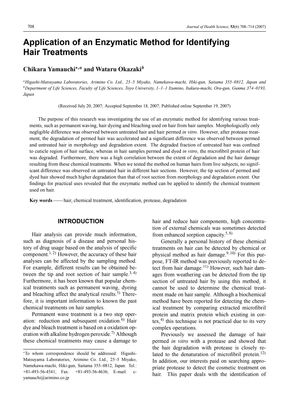Application of an Enzymatic Method for Identifying Hair Treatments
January 2007
in “
Journal of health science
”

TLDR The enzymatic method can effectively identify chemical treatments on hair.
The research investigated an enzymatic method to identify hair treatments like permanent waving, dyeing, and bleaching. It found that protease treatment accelerated degradation in permed hair, revealing significant morphological differences compared to untreated hair. Untreated hair degradation was limited to the cuticle, while treated hair showed microfibril protein degradation. The method showed high correlation between degradation extent and hair damage. Testing on human hair confirmed higher degradation at the tips of treated hair compared to roots. The study concluded that the enzymatic method could effectively identify chemical treatments on hair.





